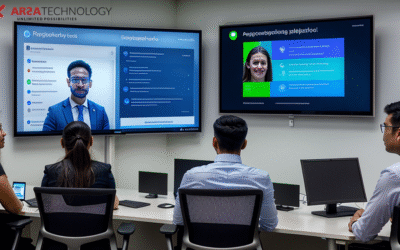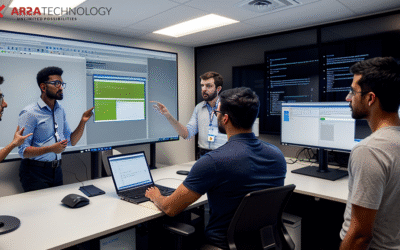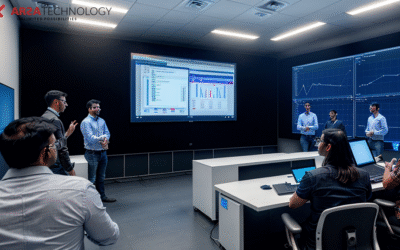Introduction: Overcoming Cheating in Remote Examinations in the Education Industry
The shift to remote learning has brought unprecedented flexibility and accessibility to education worldwide. However, it has also introduced significant challenges, particularly concerning academic integrity. Cheating in remote examinations has become a pervasive pain point for educational institutions, threatening the credibility of online degrees and the fairness of assessment processes. Traditional proctoring methods, while evolving, often struggle to keep pace with sophisticated methods of circumvention, leading to a constant arms race between educators and those seeking an unfair advantage.
This challenge isn’t merely about catching rule-breakers; it’s about preserving the value of education, ensuring equitable opportunities for all students, and maintaining institutional reputation. The need for robust, scalable, and intelligent solutions has never been more critical. Enter advanced AI, specifically Speech-to-Text (STT) API technology, which offers a powerful, nuanced approach to enhancing examination security and providing deeper insights into student behavior. ARSA Technology is at the forefront of this innovation, providing high-performance AI API products designed to meet these complex demands.
The Evolving Landscape of Remote Exam Security
Remote examinations, while convenient, present a unique set of vulnerabilities. Students might use external resources, collaborate secretly, or receive unauthorized assistance. While video proctoring can detect visual cues, it often misses auditory infractions—whispers, phone calls, or verbal prompts from off-screen individuals. This gap in surveillance is precisely where sophisticated AI-driven audio analysis becomes indispensable.
Educational institutions require tools that can not only identify potential misconduct but also do so efficiently and at scale, without infringing on legitimate student privacy. The solution must integrate seamlessly into existing learning management systems and provide actionable intelligence to proctors and administrators. ARSA Technology’s Speech-to-Text API offers a strategic advantage, transforming spoken words into searchable, analyzable data that can reveal patterns of cheating invisible to the naked eye or traditional proctoring software.
Unlocking Insights with Speech-to-Text API for Academic Integrity
Imagine a system that can transcribe every spoken word during a remote examination, flagging suspicious phrases, unusual silences, or the presence of multiple voices. This is the power of a high-performance Speech-to-Text API. By converting audio streams from student microphones into text, educators gain an entirely new layer of oversight.
ARSA Technology’s Speech-to-Text API excels in accurately transcribing spoken language, even in varied acoustic environments, making it ideal for monitoring diverse remote examination settings. To see the API in action, demo the Speech-to-Text API. This interactive demonstration highlights its capability to process audio and deliver precise transcriptions, which can then be analyzed for keywords related to exam content, unauthorized collaboration, or even stress indicators.
Beyond simple transcription, the API’s output can be fed into analytical engines to:
* Detect unauthorized communication: Identify instances where students might be speaking to others or receiving verbal prompts.
* Flag suspicious keywords: Automatically highlight terms or phrases that indicate external resource use or collaboration.
* Analyze voice patterns: Potentially identify multiple speakers in a single audio stream, suggesting unauthorized presence.
* Monitor for unusual audio events: Detect sudden noises, whispers, or long silences that might warrant further investigation.
This proactive approach significantly deters cheating and provides irrefutable evidence when misconduct occurs, fostering a fairer and more secure testing environment for all.
Beyond Proctored Exams: Enhancing Call Center Analytics and Quality Assurance in Education
While combating cheating is a critical application, the versatility of ARSA Technology’s Speech-to-Text API extends far beyond examination proctoring. In the education sector, effective communication and support are paramount. Educational institutions often operate extensive call centers for student admissions, financial aid, technical support, and general inquiries. These call centers generate vast amounts of unstructured voice data that hold invaluable insights, yet often go unanalyzed.
Leveraging Speech-to-Text API for call center analytics transforms these conversations into actionable intelligence. By transcribing every interaction, institutions can:
* Improve Student Support: Analyze common queries, identify pain points, and streamline support processes. For instance, if many students call about a specific financial aid form, the institution can proactively provide clearer guidance or update their FAQs.
* Enhance Agent Performance: Evaluate agent communication skills, adherence to scripts, and effectiveness in resolving issues. This provides concrete data for training and quality assurance, leading to better service delivery.
* Identify Trends and Challenges: Spot emerging issues, gather feedback on new policies or courses, and understand student sentiment at scale.
* Ensure Compliance: Monitor calls for adherence to regulatory requirements or internal policies, particularly important in sensitive areas like student data privacy.
The ability to accurately transcribe and analyze these conversations allows educational leaders to make data-driven decisions, optimize operational efficiency, and ultimately enhance the overall student experience. For institutions looking to further automate and personalize student interactions, the integration with generate natural voice responses with our TTS API can create a complete conversational AI solution.
Key Features and Performance of ARSA Technology’s Speech-to-Text API
ARSA Technology’s Speech-to-Text API is engineered for enterprise-grade performance, offering a suite of features that make it a superior choice for the education industry:
- High Accuracy: Powered by advanced AI models, our highly accurate transcription API delivers exceptional accuracy, even with challenging audio inputs, accents, and varying speech rates. This is crucial for reliable analysis in high-stakes environments like examinations.
- Multilingual Support: In a globalized education landscape, supporting multiple languages is non-negotiable. Our API offers robust multilingual capabilities, allowing institutions to serve a diverse student body and analyze conversations in various languages.
- Real-time and Batch Processing: Whether you need instant transcription for live proctoring or batch processing for analyzing recorded call center interactions, the API provides flexible processing options to suit different operational needs.
- Scalability: Designed to handle high volumes, the API scales effortlessly to meet the demands of large universities or global online learning platforms, ensuring consistent performance regardless of load.
- Robust Integration: Built for developers, the API offers straightforward integration into existing applications, learning management systems, and communication platforms, minimizing development overhead.
These features collectively empower institutions to deploy sophisticated audio analysis solutions with confidence, knowing they are backed by a reliable and high-performing API.
Strategic Advantages for Educational Institutions
Adopting ARSA Technology’s Speech-to-Text API offers several strategic advantages for educational institutions:
1. Enhanced Academic Integrity: By providing a powerful tool to detect and deter cheating, institutions can uphold the value of their degrees and ensure fair assessment for all students. This protects the institution’s reputation and fosters a culture of honesty.
2. Improved Operational Efficiency: Automating the transcription and analysis of voice data in call centers frees up human resources, reduces manual effort, and provides insights far more rapidly than traditional methods.
3. Better Student Experience: By understanding student needs and pain points through call analytics, institutions can proactively improve services, leading to higher student satisfaction and retention.
4. Data-Driven Decision Making: Transforming unstructured voice data into structured, analyzable text provides a rich source of information for strategic planning, curriculum development, and policy adjustments.
5. Competitive Differentiation: Institutions that leverage cutting-edge AI for security and support demonstrate a commitment to innovation and excellence, attracting both students and faculty.
The investment in such technology is not just about solving a problem; it’s about building a more resilient, responsive, and reputable educational ecosystem.
Conclusion: Your Next Step Towards a Solution
The challenges of remote education, particularly the pervasive issue of cheating in online examinations, demand innovative and robust solutions. ARSA Technology’s Speech-to-Text API offers a powerful answer, providing unparalleled accuracy and analytical capabilities to secure academic integrity. Furthermore, its application in call center analytics and quality assurance transforms raw voice data into strategic insights, driving operational efficiency and enhancing the student experience across the board.
For software developers, solutions architects, CTOs, and product managers in the education sector, integrating a high-performance speech-to-text solution is no longer an option but a strategic imperative. It’s about empowering your institution to adapt, innovate, and thrive in the evolving digital learning landscape. Explore the possibilities with ARSA Technology and take the definitive step towards a more secure, efficient, and insightful educational future.
See Why ARSA is the Right Choice for Your Business.
Don’t just take our word for it. Schedule a free, no-obligation consultation with our API experts to discuss your specific needs and get a personalized performance and ROI analysis.







